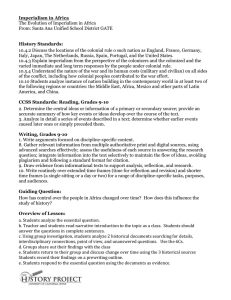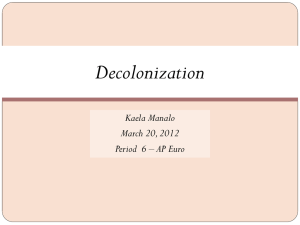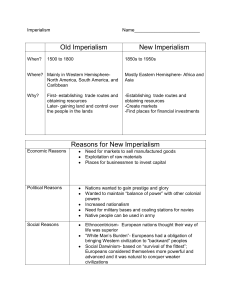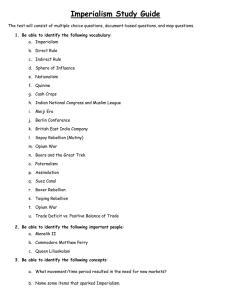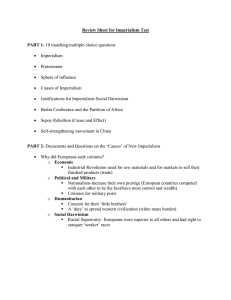2012-2013 Decolonization and Independence Lesson Plan Dates
advertisement
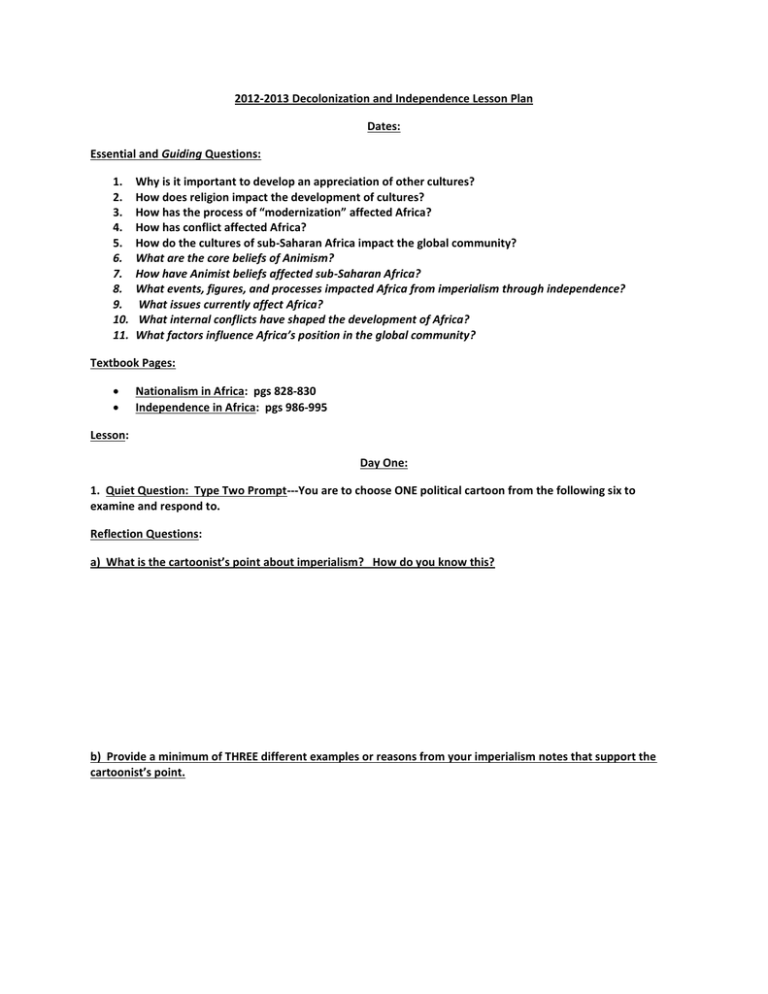
2012-2013 Decolonization and Independence Lesson Plan Dates: Essential and Guiding Questions: 1. 2. 3. 4. 5. 6. 7. 8. 9. 10. 11. Why is it important to develop an appreciation of other cultures? How does religion impact the development of cultures? How has the process of “modernization” affected Africa? How has conflict affected Africa? How do the cultures of sub-Saharan Africa impact the global community? What are the core beliefs of Animism? How have Animist beliefs affected sub-Saharan Africa? What events, figures, and processes impacted Africa from imperialism through independence? What issues currently affect Africa? What internal conflicts have shaped the development of Africa? What factors influence Africa’s position in the global community? Textbook Pages: Nationalism in Africa: pgs 828-830 Independence in Africa: pgs 986-995 Lesson: Day One: 1. Quiet Question: Type Two Prompt---You are to choose ONE political cartoon from the following six to examine and respond to. Reflection Questions: a) What is the cartoonist’s point about imperialism? How do you know this? b) Provide a minimum of THREE different examples or reasons from your imperialism notes that support the cartoonist’s point. Caption: “Thus colonize the English” 2. Pair-Share: Turn to your partner and share your political cartoon analysis. Make notes next to the different cartoons. Then with your partner, answer this Type Two Prompt---What is the message on imperialism that all the political cartoonists are arguing? Based upon all that we have learned, do you agree or disagree with them? Why? 3. Groups: We are going to jigsaw the following primary source excerpts on imperialism. You will be assigned one to read and fill in the part of the Four Square Perspectives Organizer. You will then present your analysis to your group members. Perspectives on Imperialism: a) John Gunther, Inside Africa, 1955: “The benefits the colonial system brought to Africa, even if it brought abuses too, are incontestable. Perhaps much of what the whites did was selfish, since it was for the benefit of the white communities themselves; nevertheless the record stands for itself. The Europeans may have ravaged a continent, but they also opened it up to civilization. Colonialism made today’s nationalism possible, and opened the way for democracy. The Europeans abolished slavery and ended tribal warfare. They created communications, improved the standard of living, developed natural resources, introduced scientific agriculture, fought to control malaria and other diseases, established public health controls, gave natives only an inch away from barbarism, stable government administration and a regime based in theory at least, on justice and law. (The white man’s law of course.) Most important, they brought Christianity and western education. Not much education, but some. And there had been practically none before.” b)Cecil Rhodes, a British explorer whose work led to settlements in Southern Africa. The country of Rhodesia, now known as Zimbabwe, was even named after him. In Confession of Faith 1877, he wrote: “I contend that were are the first race in the world, and the more of the world we inhabit, the better it is for the human race…it is our duty to seize every opportunity of acquiring more territory and we should keep this one idea steadily before our eyes that more territory simply means more of the Anglo-Saxon race, more of the best, the most human, most honourable race the world possesses.” c) Jomo Kenyatta, African Nationalist Leader, 1938: “There certainly are some progressive ideas among the Europeans. They include the ideas of material prosperity, of medicine, and hygiene, and literacy which enables people to take part in world culture. But so far the Europeans…have not in reality transferred this to the Africans, and the Europeans seem to think that the only way to do it is by police discipline and armed force. They speak as if it was somehow beneficial to an African to work for them instead of for himself, and to make sure…they…take away his land…they rob him of his government, condemn his religious ideas, and ignore his ideas of justice and morals…Europeans have robbed the African of the material foundations of his culture, and reduced him to an inferior state that goes against human happiness. The African…realizes the he must fight for his own complete emancipation; for without this he is doomed to remain the prey of rival imperialisms, which in every successive year will drive their fangs more deeply into his vitality and strength.” d) Tom Mboya, African Nationalist Leader, 1960: “Despite its force as an aid to Africa’s economic development, African colonialism has been the biggest hindrance to the development of the people. Under colonial rule, little attention has been paid to the need to invest in education, health, technical training, and general community development for Africans. Partition of Africa into separate colonies and the use of territories as sources of raw materials for the benefit and enrichment of the colonial powers have not allowed the planning of continental or regional development. Instead, colonial division has treated each territory in isolation from others.” 5. Groups: We will now do the group-share. Add each analysis to the Four Square Perspectives Organizer. Then in the bottom square, write YOUR OWN CONCLUSION on imperialism. 6. Class: After doing this, answer the following Type One Prompt together---When do you think the people of Africa will finally rebel against imperial rule? Why? 7. Homework: Work on your Imperialism Homework Assignment. Day Two: 8. Class: Ms. Barben is going to do her Decolonization and Independence Powerpoint, and you are to take notes in the provided graphic organizer in the following categories: 9. Homework: Continue to work on your Imperialism Homework Assignment. Day Three: 10. Class: Ms. Barben will finish her Decolonization Powerpoint Presentation, and you will finish taking notes. 11. Homework: Work on your Imperialism Homework Assignment. Day Four: 12. Groups: You will now be broken up into groups of three and be assigned one of the African Colonies who gained independence to research, take notes on, and create a poster on to teach to the class. African Colonies: British Colonies: Ghana Nigeria Kenya French Colony: Algeria Belgian Colony: Congo Portuguese Colony: Angola Resources to Use: Textbook Pages: 828-830 and 986-995 Ms. Barben’s Decolonization Powerpoint Internet ABC-Clio World Geography Database Supplemental Readings uploaded to teacher page Work Days: Learning Station Days: 2012-2013 Decolonization Poster Project Due on: Group Members’ Names: Country Assigned: Class Period: 1.___________It was completed on time and ready for the Learning Stations First Day. If not, it is 10% off the value for each day. 2.___________The name of your assigned country and who they were once a colony of was typed out in large font and at the top of the poster along with the dates of the decolonization/independence movement for the country. If not it is 5% off the value of the assignment. 3.___________There was a timeline of at least 8 major dates chronicling the independence and decolonization process for the country. Worth 40 Points. It should be in chronological order. It should have the dates, the names of the events, and a description about each event that is at least THREE WELL-DEVELOPED SENTENCES for each event. The description should answer the questions of Who, What, When, Where, How, Why, and Impact. This can be downloaded and enlarged from a credible website, be a timeline that was downloaded and modified by your group, or created entirely by your group. 4.___________The leaders and major organizations of the independence movement were identified in a chart format. Worth 25 Points. Each must have a description that is at least THREE WELL-DEVELOPED SENTENCES long and does not repeat the same information from the timeline, but expands and goes more in depth. The descriptions must answer the questions of Who were they, What did they do, What role did they have in the independence movement, What strategies were used, and What was their role after independence. 5.__________The results of the decolonization and independence process were identified in a chart format. Worth 20 Points. The short term and long term effects---positives and negatives were addressed. Each was given a description/explanation that was a minimum of THREE WELL-DEVELOPED SENTENCES. 6.__________There was a minimum of THREE images with captions. Worth 15 Points. Each image was cut out and pasted on construction paper backing to make them stand out. Each image had a caption that described what was happening in the image and how it related to the decolonization process. Each caption was a minimum of THREE WELL-DEVELOPED SENTENCES. 7.__________No Excuses: All the information was typed, spell-checked, grammar-checked, and edited for capitalization. The information was laid out neatly and in an organized manner. Worth 10 Points. Total: /110 Points Comments: Day Five: 13. Groups: Work on your Decolonization Poster. 14. Homework: Work on your Decolonization Poster. Day Six: 15. Groups: Work on your Decolonization Poster. 16. Homework: Finish your Decolonization Poster. Day Seven: 17. Class: The Decolonization Posters will be hung around the room, and the class will now move around and takes notes filling in the gaps in the graphic organizer. 18. Homework: Work on finishing up your Imperialism Homework. It is due the day we begin the next lesson on Apartheid in South Africa. Day Eight: 19. Class: This is your last day to visit the posters and get the notes for the graphic organizer. 20. Homework: Finish your Imperialism Homework. It is due the next class period.

